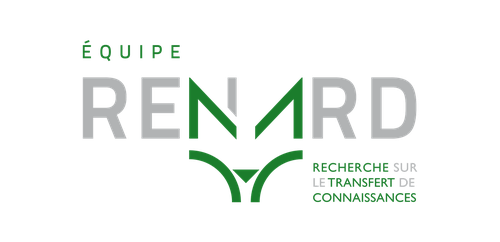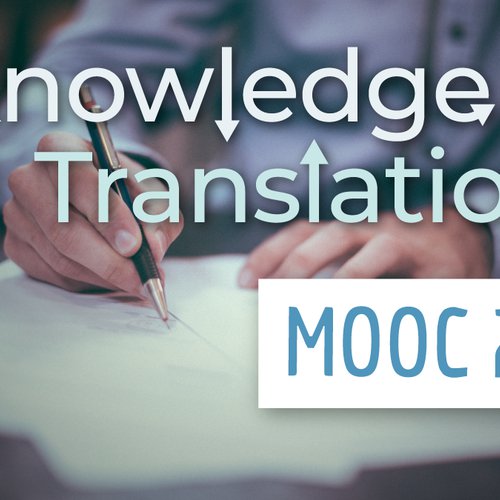Knowledge Translation 2 – Policy Brief
- Durée : 5 semaines
- Effort : 15 heures
- Rythme : ~3 heures/semaine
Welcome to this course on the preparation of a policy brief!

RENARD102-EN+2T2025
- Inscription
- Du 1 mai 2025 au 30 avril 2026
- Cours
- Du 1 mai 2025 au 30 avril 2026
- Langues
- Anglais
Description
Welcome to this MOOC, part 2 of a series titled Knowledge Translation: Promoting Evidence-informed Practices and Policies.
These days, researchers, practitioners and decision makers are placing greater emphasis on using evidence to improve interventions, healthcare and the well-being of populations. This trend is particularly significant in sectors that address social issues such as health, social, educational and judicial interventions and services. This movement can be seen in the emergence of new approaches that promote an increased use of research: knowledge translation, evidence-informed decision-making and practices, knowledge mobilization, knowledge utilization, knowledge enhancement, etc.
Studies on the subject show that the process leading to the use of knowledge is so complex that science and research still barely get taken into account in practice and decision-making communities. There is consensus in scientific literature that the efforts made to make scientific knowledge available are necessary, but not sufficient, for their actual use in practice communities. This course has been designed to address these issues.
This series of free online courses was developed by the RENARD team in collaboration with the Institut de recherche pour le développement and with the support of Université de Montréal’s Centre de pédagogie universitaire.
The second MOOC in the series focuses exclusively on the preparation of policy briefs. By the end of this course, you will be able to distinguish between different types of policy briefs and identify key elements that characterize their effectiveness. In addition, you will learn more about the different steps involved in producing a policy brief and the different choices that must be made with regards to its content. You will therefore be better equipped to prepare your own clear, rigorous, credible and convincing policy briefs.
Module Overview
- Module 1 – What is a policy brief?
- Module 2 – What does the research on policy briefs say?
- Module 3 – What are the key characteristics of a convincing policy brief?
- Module 4 – How do you prepare a policy brief?
- Module 5 – How do you write and present a policy brief effectively?
Other MOOCs in this series
Knowledge Translation 1 - Introduction
Knowledge Translation 3 - Knowledge Brokering
This series of courses is free and accessible throughout the year. You can participate at your own pace.
How does the course work?
Several teaching methods are used to facilitate your learning:
- Educational videos presenting theoretical notions and concrete examples
- Vox pops presenting the point of view of people working in the field
- Short quizzes to validate your understanding of the concepts presented
- Readings to consolidate and deepen your learning
- Practical exercises allowing you to put into practice the notions learned
Target audience
This online course is intended for anyone who wants to learn and develop skills to conduct knowledge translation activities, such as researchers, student researchers, research professionals, health professionals, decision-makers and managers of health interventions and services, etc. Although this course is most applicable to the health and social services field, it is relevant to many other fields.
Course certificate
This MOOC represents approximately 15 hours of free content. Graded activities leading to a certificate of achievement is available for a fee. You will also have the option to obtain a free certificate of achievement.
Autres sessions de cours
Archivé
- RENARD102.1-EN, inscription du 21 janvier 2022 au 28 mars 2024
- RENARD102-EN+2T2024, inscription du 8 avril 2024 au 30 avril 2025
Équipe pédagogique
With the participation of...
Catherine Hébert, M.Sc
Documentary Filmmaker | Mango Films
Diana Arnautu, B.Sc
PhD candidate in work and organizational psychology | Université de Montréal
Brigitte Des Rosiers, Ph.D
Research Ethics Advisor
Instructional design
Dominique d’Anjou
Instructional Designer | Centre de pédagogie universitaire, Université de Montréal
Caroline De Coninck
Instructional Designer | Centre de pédagogie universitaire, Université de Montréal
Media
Francis Brosseau
Media Designer | Centre de pédagogie universitaire, Université de Montréal
Mélodie Averna
Media Designer | Centre de pédagogie universitaire, Université de Montréal
Michel Desroches
Cameraman | Productions Michel Desroches
Special Project Advisor
Robert Gérin-Lajoie
Special Project Advisor | Centre de pédagogie universitaire, Université de Montréal
Support & quality control
Vincent Laberge
EDUlib | Centre de pédagogie universitaire, Université de Montréal
Camille Briquet
EDUlib | Centre de pédagogie universitaire, Université de Montréal
Partners
 |  |
We also wish to thank all the participants who were featured in the vox pop videos!
The content of this course is available under Creative Commons licence "CC BY-NC-ND"
Content offered under this licence can be used (without modifications) for non-commercial purposes as long as credit is given to the creator.





